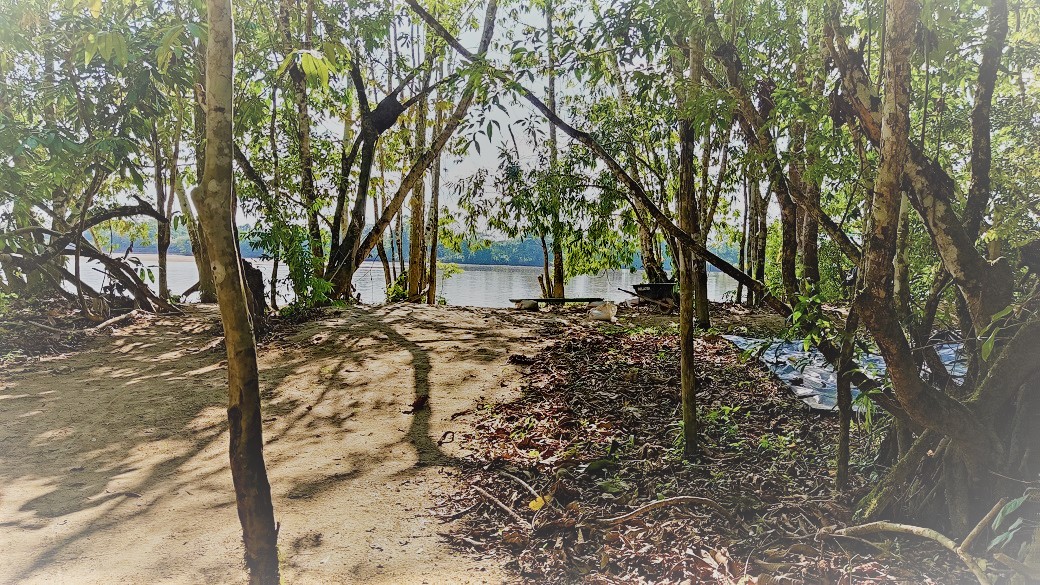Results for “geoengineering”
El cambio climático y la captura corporativa de las políticas versus el enfoque de derechos y gobernanza
Un evento paralelo de dos paneles organizado por la Alianza CDB (CBD Alliance) durante la COP15 del CDB en Montreal el jueves 8 de diciembre, Conference Space, 18:00 – 21:00 Clima y biodiversidad y los riesgos de las falsas soluciones 18:00 – 19:30 Facilitadora: Ana Di Pangracio, FARN, Argentina Handaine Mohammed, Comité de Coordinación de los Pueblos Indígenas de África: Los derechos de los pueblos indígenas en la COP27 y la COP15 (por confirmar) Nele Marien, Amigos de la Tierra …
Declaración de los Pueblos por la Justicia Climática de la COP27
17 de noviembre de 2022, Sharm El Sheikh–Cientos de activistas climáticos, representantes de pueblos indígenas, activistas de los derechos humanos, defensores del medio ambiente, trabajadores y grupos feministas se han reunido hoy en la sesión plenaria de los pueblos en la COP27. Firmaron una Declaración de los Pueblos por la Justicia Climática que incluye la exigencia de descolonizar las economías y las sociedades, pagar la deuda climática y abordar el calentamiento global reduciendo las emisiones a cero para 2030. La …
La Coalición Mundial por los Bosques en la COP27
La Coalición Mundial por los Bosques está presente en Sharm El Sheikh, Egipto, para la COP27 (6-18 de noviembre de 2022). Tenemos 11 portavoces sobre el terreno y hablaremos en 8 eventos, en los que abogaremos por soluciones reales a la crisis climática. Aquí tiene todos los detalles sobre nuestras actividades: Conferencia de prensa 17 de noviembre: PRESS CONFERENCE: HOME Alliance says no to ‘removals’ and geoengineering in UNFCCC Article 6.4 Evento 16 de noviembre: Informe publicado el 14 …
DECLARACIÓN: ¡África grita, nuestro bosque, nuestra vida!
Levantémonos y luchemos colectivamente contra la expansión del extractivismo Por Kwami Kpondzo Ha llegado el momento de liberar a África de la expansión de los combustibles fósiles y del peso de la crisis climática. África sigue asfixiada por la persistencia de los efectos del cambio climático. El continente se está cocinando por el rápido aumento de la temperatura. Continuar leyendo en inglés… The Working Group I report of IPCC’s Sixth Assessment Report (AR6), which will be published next year, …
El fin de las falsas soluciones: avanzando hacia soluciones basadas en derechos y transformadoras de género ante el cambio climático
Las falsas soluciones al cambio climático son cada vez más denunciadas y rechazadas por las comunidades de todo el mundo. Existen verdaderas soluciones basadas en los derechos y que transforman el género, y son la única manera de evitar el catastrófico aumento de la temperatura global. Los responsables políticos de los bosques y el cambio climático deben tener en cuenta estas soluciones reales. Consulte el último número de Cobertura Forestal para conocer más. El número 68 de Cobertura Forestal ofrece un …
Los archivos Cero Neto: Cómo se utiliza el lavado verde para reducir la ambición climática
La Tierra es finita, la naturaleza es finita y la capacidad de retención de carbono de la naturaleza es finita. CLARA LAUNCHES THE NET ZERO FILES Earth is finite, nature is finite, and the carbon-holding capacity of nature is finite. The Net Zero Files, 18 concise briefings which call out bad Net Zero commitments and put the focus back on deep decarbonization, were launched this week by the Climate, Land, Ambition, and Rights Alliance (CLARA) at https://www.clara.earth/netzero and on Twitter …
Contagio corporativo: Cómo el sector privado está capturando las Cumbres de las Naciones Unidas sobre Alimentación, Biodiversidad y Clima
Con tres cumbres cruciales de las Naciones Unidas programadas durante los próximos seis meses, 2021 será un año clave para el control corporativo de las políticas sobre la biodiversidad y el clima. Dado que la participación de la sociedad civil seguirá siendo fuertemente limitada en el futuro previsible, se están preparando una serie de políticas extremadamente perjudiciales. Usted puede bajar este informe en español, inglés, francés, russo y el texto abajo. Contagio corporativo: Cómo el sector privado está capturando las Cumbres de …
¿Economía circular o círculo vicioso? Cómo la captura corporativa en la elaboración de políticas y de incentivos perversos promueve la deforestación
El nuevo número de nuestra serie de informes Cobertura Forestal analiza la captura corporativa de la elaboración de políticas gubernamentales y los incentivos perversos que dañan la biodiversidad, lo que constituye un ciclo que se retroalimenta. Incluye análisis de grupos miembros y aliados cercanos en nueve países sobre incentivos para la expansión de la ganadería insostenible, plantaciones comerciales de árboles, generación de bioenergía y otras industrias que impulsan la pérdida de bosques. Los ejemplos de América Latina, Europa, Asia y …
Cobertura Forestal 61: #OurNatureIsNotYourSolution, Día internacional de la biodiversidad
Como parte de la campaña #OurNatureIsNotYourSolution (#NuestraNaturalezaNoEsSuSolucion), lanzamos esta edición especial de nuestra revista Cobertura Forestal, escrita en colaboración con nuestros grupos miembros. Esta edición pone de manifiesto cómo se está utilizando la popularidad de las SbN para impulsar compensaciones forestales, monocultivos de árboles y otras muchas soluciones falsas. Esta edición también proporciona ejemplos de soluciones reales de las que nuestros miembros en Colombia, Ghana, Nepal, Panamá, Paraguay y Sri Lanka son partícipes.
Descarrilar las negociaciones sobre los mecanismos de mercado: las soluciones falsas no traerán equidad ni justicia climática
por Souparna Lahiri, Global Forest Coalition, India El resultado de la COP24 en Katowice el pasado diciembre fracasó en muchos aspectos, a pesar del «salto de victoria» del Secretario de Estado de Energía de Polonia (el presidente de la COP24). Pero de lo que los medios de comunicación se hicieron eco fue del fracaso de los gobiernos para ponerse de acuerdo en el texto del Artículo 6 del Acuerdo de Paris, el cual trata, entre otras cosas, sobre los mecanismos …
Feministas en UNEA4 continúan con el llamado por el derecho a un medio ambiente sano y sostenible
En la 4ª Reunión de la Asamblea de las Naciones Unidas para el Medio Ambiente en Nairobi, Kenia, los estados miembros aprobaron una resolución histórica para promover la igualdad de género y los derechos humanos así el empoderamiento de mujeres y niñas en gobernanza ambiental. Continuar leyendo en ingles… Reflecting on the outcomes of UNEA4, the Women’s Major Group offered the following statement: Feminists at UNEA4 Continue the Call for the Right to a Healthy and Sustainable Environment The conclusion …
Cobertura Forestal 57: 1.5 ° C desde la perspectiva de las comunidades
Los gobiernos se reúnen una vez más en la COP sobre cambio climático, que tendrá lugar en Katowice, Polonia, y en este numero de Cobertura Forestal 57 se hace un análisis critico del último informe especial del IPCC sobre el calentamiento global de 1.5°C. Cobertura Forestal analiza lo que significa este objetivo desde la perspectiva de las comunidades y defiende la conservación comunitaria como una forma efectiva, segura y equitativa de eliminar el carbono de la atmósfera.
Las Instituciones de la ONU deben cumplir con la meta de detener la deforestación para el año 2020, dicen grupos forestales en el Día Internacional de la Diversidad Biológica
Mayo 22, 2016. En el Día Internacional de la Diversidad Biológica, y un día antes de la reunión de la Asamblea de las Naciones Unidas para el Medio Ambiente en Nairobi [1], la Coalición Mundial por los Bosques (GFC) [2] les recordó [3] a los responsables de las políticas que detener la deforestación en 2020, en línea con la meta 15.2 de los Objetivos de Desarrollo Sostenible (ODS) [4], y la restauración forestal impulsada por la comunidad, deben convertirse en …
Secuelas del Acuerdo de París: la naturaleza y la humanidad salen perdiendo
Mary Louise Malig[1] El Acuerdo de París se firmó en Nueva York con bombos y platillos, muchos apretones de manos y elogios mutuos, afirmando que “lo logramos” – es decir, logramos un acuerdo histórico sobre el clima que salvará al planeta del caos climático. Esta semana, los delegados de los gobiernos y la sociedad civil regresan a trabajar en Bonn, en las reuniones del Órgano Subsidiario de Ejecución (SBI 44), del Órgano de Asesoramiento Científico y Tecnológico (SBSTA 44), y …
COP 21: Victorious Corporations
Negotiations to solve climate change started 23 years ago. Ever since then, a trend towards commercializing the problems and the solutions started to be identifiable. More and more neoliberal tendencies that dominated developed country governments -and important developing ones too- took over all aspects and approaches to the problem. Suddenly, civil society also became swamped in the same bog, logged with noncommittal and denying language and flooded with false solutions. Paris FCCC/COP XXI was not an exception to that tendency. …
El mito de la neutralidad del carbono de la bioenergía es una bomba bajo el acuerdo climático propuesto – nuevo reporte
Martes 8 de diciembre, París: la Global Forest Coalition [1] lanza un nuevo informe en las conversaciones sobre el cambio climático en París titulada «Biomitos, la costosa estafa de la bioenergía del carbono«. [2] El informe expone cómo la bioenergía a gran escala está siendo promovida como un reemplazo para algunos combustibles fósiles, sobre la base de lo que se denomina el mito de la «neutralidad de carbono». «Aceptar que la bioenergía a gran escala puede ser neutra en emisiones …
Los que “se las Saben Todas” de la Conservación de la Biodiversidad
Simone Lovera Para aquellos que están actualmente siguiendo las negociaciones altamente polarizadas e improductivas sobre el clima podría parecer increíble, pero todavía hay procesos de la ONU que logran acordarse sobre una cantidad razonable de decisiones durante un poco más de 3 días completos de negociación. La 19ª reunión del Órgano Subsidiario de Asesoramiento Científico, Técnico y Tecnológico del Convenio sobre la Diversidad Biológica (CDB-OSACTT), que tuvo lugar del 4 al 7 de Noviembre en Montreal, incluso terminó un poco …










